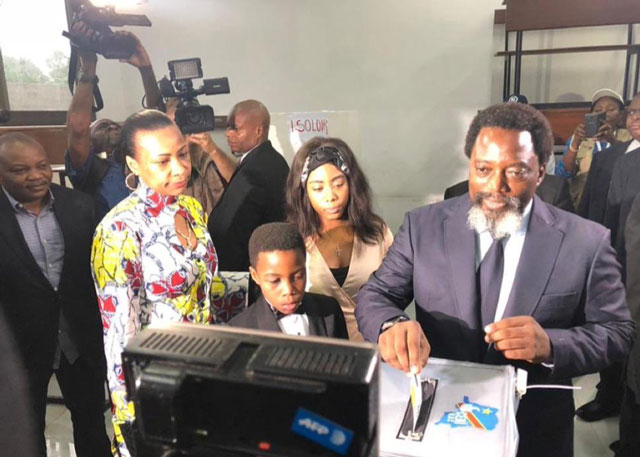
Kinshasa, DR Congo | AFP | Felix Tshisekedi was sworn in as the Democratic Republic of Congo’s new president Thursday after an election fraught with delays and doubts.
Here is a recap.
– Two-year delay –
After being postponed three times, the elections go ahead on December 30, 2018 to chose a successor to President Joseph Kabila.
His term ran out in late 2016 and his extended stay in power had resulted in demonstrations and criticism.
The election is held in relative calm although clashes claim four lives in the volatile eastern South-Kivu province.
Voting is delayed until March 2019 in two regions affected by unrest and Ebola.
– Tensions –
On December 31 the influential Catholic bishops conference says its observers had signalled anomalies in the vote count.
On January 2, with tensions growing, Kinshasa pulls the accreditation of a French radio journalist and halts broadcasts of the popular Radio France Internationale (RFI).
– Surprise result –
After a long delay the electoral commission issues provisional results in the early hours of January 10, declaring that opposition candidate Felix Tshisekedi won with 38.57 percent.
Pre-vote favourite, the opposition’s Martin Fayulu, took 34.8 percent, it says.
Kabila’s chosen successor, Emmanuel Ramazani Shadary, has 23.8 percent.
Fayulu immediately denounces an “electoral coup”.
– Results disputed –
France queries the result and the United States calls for “clarification”. The Catholic Church says it does not tally with its own data.
On January 11 a curfew is declared in Kikwit, Fayulu’s bastion in the west, where at least nine people are killed in protests.
– Towards co-habitation –
Legislative election results are announced on January 12 giving pro-Kabila parties a majority in the national assembly.
It means that Tshisekedi’s prime minister will come from Kabila’s camp.
– Court challenge –
Fayulu lodges an appeal on January 12 in the Constitutional Court against the presidential vote results.
The following day the Southern African Development Community (SADC) regional bloc urges a recount.
On January 15 documents leaked to foreign media — including the Financial Times, TV5 Monde and RFI — back Fayulu’s claim to be the winner.
– Tshisekedi confirmed –
On January 18 the DR Congo rebukes the African Union for expressing “serious doubts” over the provisional result, saying the Constitutional Court — considering Fayulu’s appeal — is impartial.
The court on January 20 dismisses the appeal and confirms Tshisekedi as winner.
Fayulu calls on the international community to reject Tshisekedi’s victory.
– Doubts, recognition –
The same day SADC congratulates Tshisekedi and calls for a peaceful handover of power.
The EU says that “doubts remain”.
After talks in Brussels, the AU and EU signal on January 22 their willingness to accept Tshisekedi as winner and to work with him as president.
 The Independent Uganda: You get the Truth we Pay the Price
The Independent Uganda: You get the Truth we Pay the Price



